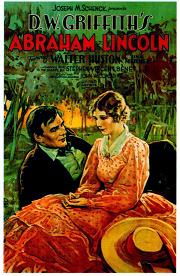Abraham Lincoln (1930 film)
| Abraham Lincoln | |
|---|---|
 |
|
| Directed by | D. W. Griffith |
| Produced by | D. W. Griffith Joseph M. Schenck |
| Written by |
Stephen Vincent Benet John W. Considine Jr. Gerrit J. Lloyd |
| Starring |
Walter Huston Una Merkel William L. Thorne |
| Music by | Hugo Riesenfeld |
| Cinematography | Karl Struss |
| Edited by |
John W. Considine Jr. James Smith |
| Distributed by | United Artists |
|
Release date
|
August 25, 1930 |
|
Running time
|
97 minutes |
| Country | United States |
| Language | English |
Abraham Lincoln, also released under the title D. W. Griffith's "Abraham Lincoln", is a 1930 Pre-Code biographical film about American president Abraham Lincoln directed by D. W. Griffith. It stars Walter Huston as Lincoln and Una Merkel, in her second speaking role, as Ann Rutledge. Her first speaking role was in a short film, Love's Old Sweet Song (1923) filmed in the Phonofilm sound-on-film process. The script was co-written by Stephen Vincent Benét, author of the Civil War prose poem John Brown's Body. This was the first of only two sound films made by Griffith.
The film entered the public domain in 1958 due to the rights holders failure to renew the copyright after 28 years.
The first act of the film covers Lincoln's early life as a storekeeper and rail-splitter in New Salem and his early romance with Ann Rutledge, and his early years as a lawyer and his courtship and marriage to Mary Todd in Springfield. The majority of the film deals with Lincoln's presidency during the American Civil War and culminates with Lee's surrender and Lincoln's assassination at Ford's Theatre.
All principal actors are deceased.
The film received positive reviews from contemporary critics. Mordaunt Hall of The New York Times called it "quite a worthy pictorial offering with a genuinely fine and inspiring performance by Walter Huston in the role of the martyred President" and later put it on his year-end list of the ten best films of 1930. "More than an outstanding classic of sound pictures, Abraham Lincoln eclipses the most conservative illusion of a modernized Birth of a Nation", wrote Variety in a rave review. "It is a startlingly superlative accomplishment; one rejuvenating a greatest Griffith. In characterization and detail perfection it is such as to be almost unbelievable."Film Daily called it a "distinguished and human narrative" and wrote that Huston's performance "may be listed as one of the 10 best of the year – or any talker year."John Mosher of The New Yorker wrote that it was "by and large.....a pretty high-grade picture." Despite these accolades, however, the film's box office performance was uneven.
...
Wikipedia
